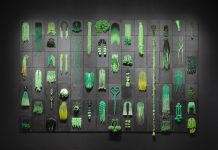
I wanted to barf. My midsection was pressed against the upstairs balcony railing, which was acting as a kickstand for the broken-down bicycle that was my body.
My legs вҖ” and throbbing brain вҖ” had gone to jelly on that March 8, 1992, evening at Saint AndrewвҖҷs Hall during My Bloody ValentineвҖҷs extreme exploration of вҖңYou Made Me Realise.вҖқ The song is a 3-minute, 46-second noise-pop blast on record, but in concert, the Irish shoegaze pioneers weaponized it, holding a single chord anywhere from 15 minutes all the way to an anti-social 35.
ItвҖҷs the sort of thing you might imagine being subjected to at a CIA black site, and this regular portion of My Bloody Valentine concerts came to be known informally as the вҖңholocaust section.вҖқ But the band approached this nightly assault not as torture but as a search for transcendence.
Drowning out the pain in pursuit of pleasure.
When my legs finally gave out, I slid down the railing and fell against it, my hands smashed against my ears, my mind filled with alternating sensations of regret, bliss, aches, and the electricity of life.
It was like an indie-rockerвҖҷs Temptation of Christ: If you could withstand the desire to run out of the club, if you could suppress the urge to have your dinner exit your piehole, if your rib cage could just hold its frame around your heart a bit longer, it would feel like angels were administering to your soul and you would come out the other side touched by the hand of God.
After I passed through the vomit stage of MBV hammering вҖңYou Made Me Realise,вҖқ then past the legs-not-working plateau and the fear of my liver exploding, the bandвҖҷs wall of feedbacking amps finally felt like heaven to me.
The possibility for this sort of art-induced spiritual sensation is what I miss most during the COVID-19 crisis, where the smart people among us have necessarily turned to virtual living to mitigate the virusвҖҷ spread.
ItвҖҷs not that IвҖҷm prone to Stendhal Syndrome, named after the 19th-century French writer (nГ©e Marie-Henri Beyle) who was so overcome by the frescoes at FlorenceвҖҷs Basilica of Santa Croce during his 1817 visit to Italy that he felt physically weak. As Stendhal wrote in his autobiography, Souvenirs dвҖҷГ©gotisme (Memoirs of an Egotist), вҖңI was in a sort of ecstasy, from the idea of being in Florence. вҖҰ Absorbed in the contemplation of sublime beauty вҖҰ I reached the point where one encounters celestial sensations. вҖҰ Everything spoke so vividly to my soul. вҖҰ I had palpitations of the heart, what in Berlin they call вҖҳnerves.вҖҷ Life was drained from me. I walked with the fear of falling.вҖқ
As much as I want a Facebook Live concert by my favorite musician to give me the вҖңfear of falling,вҖқ it wonвҖҷt happen. Staring at my phone, or my laptop, or my TV and watching a concert is a 2D experience in a 3D world, a stereo blip in a continuous surround-sound existence. My constitution is a little more robust than StendhalвҖҷs, so the last time I went to the Detroit Institute of Arts, I didnвҖҷt spit up on my shirt with excitement after viewing the Diego Rivera mural, and the physical response I had at the MBV concert isnвҖҷt how I usually react to a concert вҖ” I clap like the rest of you.
But I miss even a fraction of the passion that welled up in me when I could share an artistic experience in the flesh. Feeling that wave of emotion that sweeps a room when an author reads a gripping passage. The way an audience holds and exhales its collective breath as a dancer makes and lands an impossible leap. The sense of awe when a saxophonist nails an otherworldly solo. The supreme uplift people feel at the end of a stage production вҖ” the crowd, the actors, and the stage crew all sharing a moment of appreciation for one another.
COVID-19 isnвҖҷt going away anytime soon, and shared emotional experiences will mostly be online for the foreseeable future. But donвҖҷt let COVID-19 take away your humanities. (Pun intended.)
While the endless string of virtual concerts from musiciansвҖҷ bedrooms canвҖҷt replace 5,000 people roaring at the end of a song at the Fox Theatre, you owe it to yourself not to let music become something thatвҖҷs pushed to the background of your life. This is true of any cultural activity, but since we began with music, let me treat it as a stand-in for all the arts.
ItвҖҷs common to quote that one line about music by Duke Orsino from ShakespeareвҖҷs Twelfth Night, but the whole stanza is worth meditating on in our current circumstance.
If music be the food of love, play on;
Give me excess of it, that, surfeiting,
The appetite may sicken, and so die.
The duke sounds drunk in love with music, but heвҖҷs speaking from a place of melancholy вҖ” self-important and whiny though he may be вҖ” due to his unrequited adoration for Lady Olivia. Rather than deal with his emotions, the duke wants to gorge on his passion, hoping that a surfeit of sounds will soothe his broken heart.
Now is the time for all lovers of music, art, theater, film, and written word to stuff ourselves sick with our passions, to support the creators we love, and to become our own demiurges by shaping the physical world around us using all the virtual tricks that are offered in The Internet Age. Just because we are confined to our homes doesnвҖҷt mean our homes have to confine us, our creativity, our desire to connect with humanity through artistic expressions.
Take the virtual arts culture world for what itвҖҷs worth вҖ” a temporary measure, a crucial stopgap вҖ” and allow it to be your ballast where there is none, an anchor in an unmoored time, and a feast when it feels like there is no food.
Do not let your appetite for art sicken and die during this painful time, because youвҖҷre gonna need a post-COVID-19 appetite the next time My Bloody Valentine comes to Detroit and tries to make you transcend your last meal.
Christopher Porter Porter is an editor and writer who helms , the Ann Arbor District LibraryвҖҷs arts and culture blog.
|
| Мэ |
|









